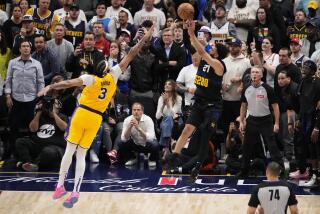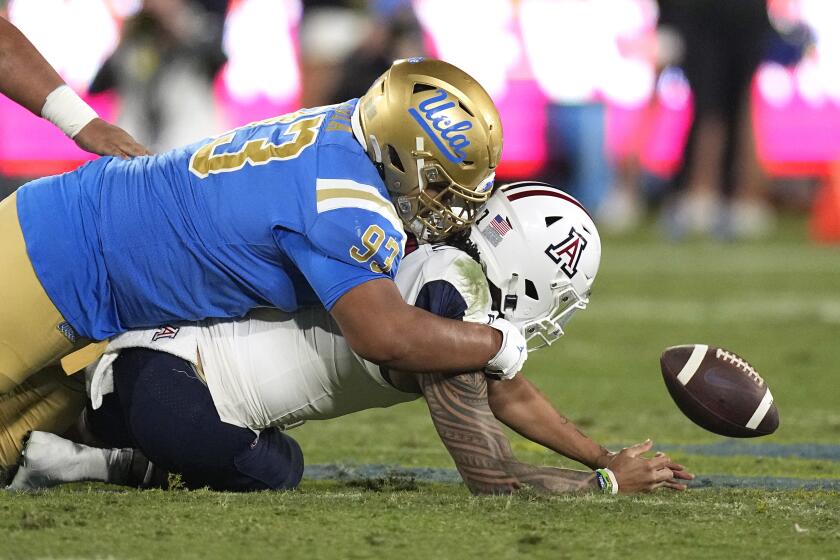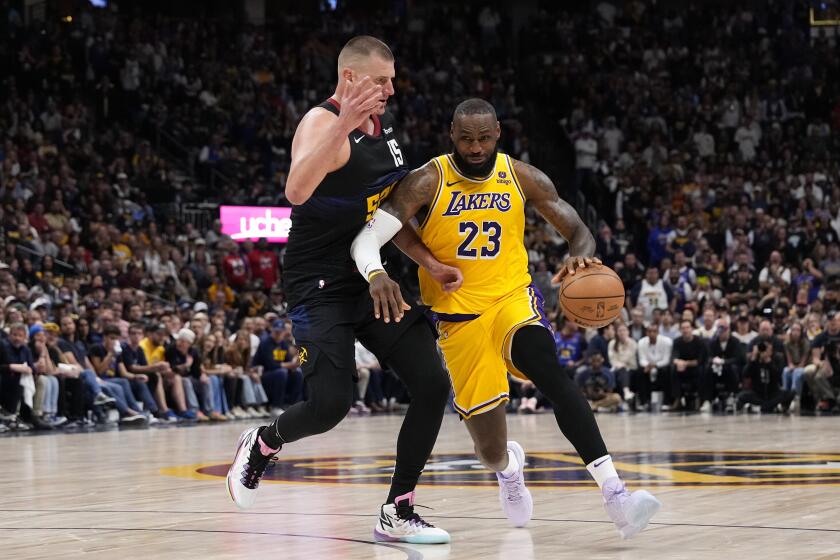Sponsors shift to avoid scandals
While T-Mobile and Adidas rethink their involvement in the scandal-plagued Tour de France, Computer Sciences Corp. is sticking with the race because the team it sponsors established a rigorous anti-doping program.
Last year, a Team CSC racer was banned from the Tour after he was entangled in one of the many instances of alleged doping that have roiled the cycling world’s most important competition. Just two months ago, the team’s owner and manager, Bjarne Riis, admitted to taking unsanctioned drugs during the 1996 Tour de France, which he won.
This year, El Segundo-based Computer Sciences and Team CSC are trying to make sure the riders can’t get into any trouble.
“All these doping allegations and rumors are not positive, but it’s how we and the other teams treat them that’s going to move the sport in the right direction,” Theresa McDermit, Computer Sciences’ brand manager, said Thursday.
A few companies are eschewing sports sponsorships as more and more athletes are caught in embarrassing situations or charged with crimes. Others are becoming more vigilant about which athletes they choose to endorse and monitoring the behavior of anyone who represents the brand.
After last year’s incident, Team CSC implemented its anti-doping program. Each member has been tested 15 times in the last six months by the team and has submitted to regular Tour tests.
Team CSC riders were tested more in the first four months of the program than any professional football or basketball player will be tested in their entire career, according to the company. Said McDermit, “We stick with our partners, as long as we have a level of trust and confidence in their programs.”
Computer Sciences has a clause in its contracts allowing it to terminate its sponsorship if there is evidence of systematic doping. In fact, in the last few years, more and more sponsors have insisted on contracts that allow them an out if athletes do something that damages a sponsor’s reputation. And companies affiliated with leagues or events instead of individuals are pressuring their partners to implement more stringent rules.
All the measures mean that there probably won’t be a dent in the $9.9 billion expected to be spent on sports sponsorships in 2007.
“We’re going to see a greater interest and involvement in preventing these incidents,” said Don Hinchey, vice president of communications at Bonham Group, a Denver-based sports marketing firm. “If you can be part of the rehabilitative process, you’re able to transmute the potential negative into a positive.”
The Tour isn’t the only sport worrying corporate sponsors. On Thursday, Michael Vick, the Atlanta Falcons quarterback, pleaded not guilty to federal dogfighting charges. He didn’t lose his Nike sponsorship though. The sports apparel and gear maker said it would stand by Vick. Nike maintained relationships with other controversial athletes, including Kobe Bryant, when they were in trouble.
Nike said in a statement last week that it was concerned by Vick’s alleged actions but that he “should be afforded the same due process as any citizen, therefore, we have not terminated our relationship.” Nike did, however, suspend its release of the Nike Air Zoom Vick V shoe until further notice.
The string of recent high-profile incidents is spurring corporate sponsors to do more research before signing an athlete for an endorsement deal, Hinchey said. Companies are also playing it safe by inking endorsement deals with who they consider more reliable athletes, said Jim Andrews, editorial director of the IEG Sponsorship Report. They include retired stars, such as baseball’s Cal Ripken Jr. and basketball’s Michael Jordan, or those with a history of safe behavior, such as quarterback Peyton Manning of the Indianapolis Colts. Manning has more than half a dozen sponsorship deals worth more than $11 million.
Sometimes, a major competition can benefit from sponsor pressure. David D’Alessandro, president of John Hancock, forced the International Olympic Committee to enact major reforms in 1999 by threatening to withdraw his company’s multimillion-dollar sponsorship after the Salt Lake City bidding scandal. D’Alessandro renewed the company’s Olympic sponsorship in 2000 after complimenting the IOC for listening to voices for change.
Sponsors are probably applying that kind of pressure behind the scenes in professional basketball and baseball, IEG’s Andrews said. This week, an NBA referee was accused of fixing games, and Major League Baseball has been facing increasing criticism about steroid issues as Barry Bonds draws closer to breaking Hank Aaron’s career home run record.
“If I’m a NBA sponsor, I’m saying you guys better be doing something to make sure the damages are minimized,” Andrews said.
For all the sponsors’ worries, fans have shown a high tolerance for athletes who stray. Even after another year of doping scandals, viewers seem to be flocking to Versus, the cable TV channel that shows Tour de France footage in the U.S. The total number of viewers who have watched the morning telecasts live or on the same day through their digital video recorders on the first 19 days since it began July 7 was up 21% compared with a year earlier, according to data provided by the channel. Total unique visitors to the company’s website were up 15% from a year earlier.
And if fans are sticking around, sponsors will too.
“Sports fans in general seem to have a pretty high tolerance,” Andrews said. “That lets a lot of sponsors lean toward saying we’ll ride this out.”
More to Read
Get our high school sports newsletter
Prep Rally is devoted to the SoCal high school sports experience, bringing you scores, stories and a behind-the-scenes look at what makes prep sports so popular.
You may occasionally receive promotional content from the Los Angeles Times.







